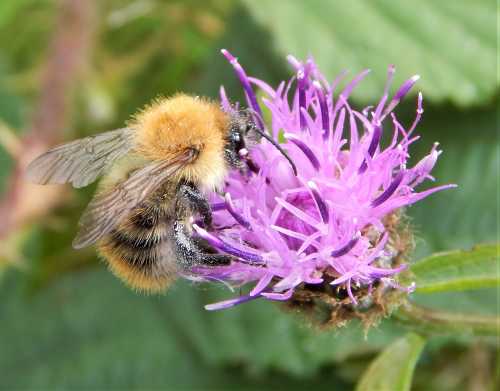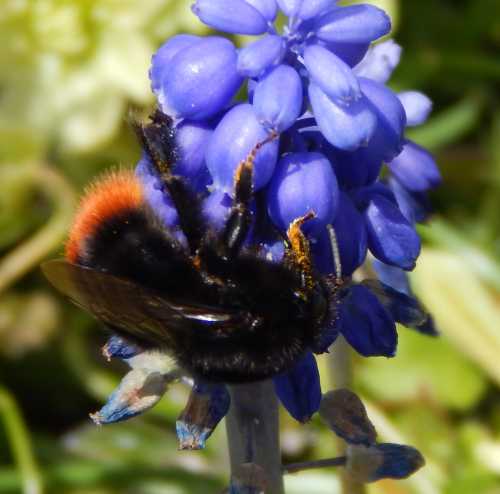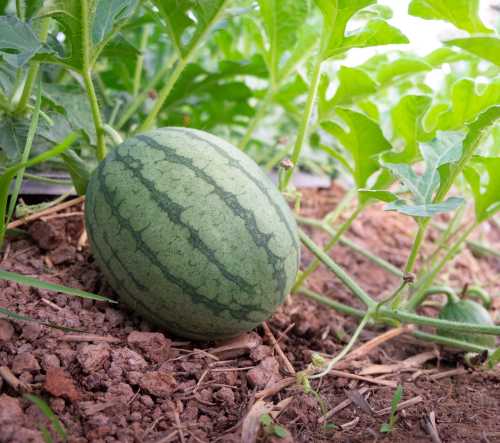Do Bumble Bees Sting?
Yes, some bumble bees do sting, but in general, bumble bees are
not aggressive, and a sting is not very common.
Here, you can read about which bumble bees sting, when they are most likely to use their stingers, plus other facts about bumble bee stings.
Do All bumble bees have stingers?
All female bumble bees have stingers, are able to sting, and may do so if they feel threatened, for example, if attempts are made to handle or interfere with them.
However, male bumble bees cannot sting.
 Common carder bumble bee foraging on knapweed
Common carder bumble bee foraging on knapweedWhy don’t male bumble bees sting and when do females use their stingers?
- Firstly, the bee sting is a ‘modified ovipositor’
– or egg-laying tube that is kept concealed in a cavity at the rear end of the
abdomen when not in use. It is used for
laying eggs, but may also be used in defense.
Only the females lay eggs.
Egg laying in a colony of bumble bees, is the role of the queen, however, having an ovipositor, female workers can and do sometimes lay eggs.
Such eggs would produce only male bees if allowed to develop, and are generally destroyed by the active queen as soon as possible, by eating the eggs.
This same phenomenon is seen in honey bee colonies where some workers take on the role of ‘policing’ the egg laying of other colony members to prevent worker eggs developing into adults. - The females rather than the males, engage in
colony defense activities as required, including nest guarding and combatting
predator attacks. This may require the
workers and/or queen to use their stingers.
- Queens may fight with other queens when competing for nest sites, and may use their stingers at such times.
Can
bumble bees sting more than once?
Yes, unlike honey bees, bumble bees have a smooth stinger. This means that the stinger can pierce the skin without getting lodged.
Honey bees, in contrast, have a barbed stinger that hooks into the skin, and tears the abdomen of the bee as it tries to pull away, hence simultaneously killing the bee. A female bumble bee can, however, sting repeatedly due to her smooth stinger.
How
painful are bumble bee stings?
Do big
bumble bees have a more painful sting than smaller bumble bees?
 A red-tailed bumble bee queen may be larger than workers and some others species, but does this mean the sting would be more painful?
A red-tailed bumble bee queen may be larger than workers and some others species, but does this mean the sting would be more painful?I’m not aware of any studies comparing bee sting by size of bee, however, on my page detailing various bee sting facts, I mention the Schmidt Pain Index.
The author of the index, Justin O Schmidt1,2 subjected himself to stings from all kinds of arthropods, including bees and other hymenoptera (ants, wasps and hornets) and categorized the level of pain as he experienced it, giving a score of 1 for least painful, and 4 for most painful.
Most bees species tested, were graded at around the 1 mark – significantly less painful than say, the bullet ant.
The sting pain of some honey bee and bumble bee species was graded at 2. See Which bee has the most painful sting.
Resources
- Schmidt JO. Pain and Lethality Induced by Insect Stings: An Exploratory and Correlational Study. Toxins (Basel). 2019;11(7):427. Published 2019 Jul 21. doi:10.3390/toxins11070427
- Schmidt, J. O. (1990). Hymenopteran venoms: striving toward the ultimate defense against vertebrates. Insect defenses: adaptive mechanisms and strategies of prey and predators. State University of New York Press, Albany, 387-419
